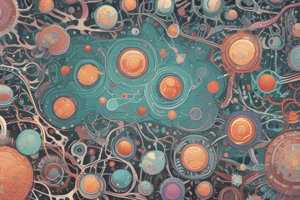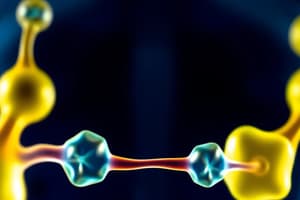Podcast
Questions and Answers
What is the primary function of growth hormone (Gh)?
What is the primary function of growth hormone (Gh)?
- Stimulates nerve regeneration
- Reduces fat metabolism
- Stimulates growth and cell reproduction (correct)
- Inhibits cell reproduction
How does growth hormone exert its effects on target cells?
How does growth hormone exert its effects on target cells?
- By inhibiting insulin-like growth factor 1 production
- By binding to insulin receptors
- By activating the JAK-STAT signaling pathway (correct)
- Directly altering DNA sequences
Which hormone primarily regulates the release of growth hormone?
Which hormone primarily regulates the release of growth hormone?
- Corticotropin-Releasing Hormone
- Growth Hormone-Releasing Hormone (correct)
- Thyroid-Stimulating Hormone
- Insulin
What can be a consequence of growth hormone deficiency in children?
What can be a consequence of growth hormone deficiency in children?
What is a possible side effect of excessive growth hormone use?
What is a possible side effect of excessive growth hormone use?
What is one role of insulin-like growth factor 1 (IGF-1)?
What is one role of insulin-like growth factor 1 (IGF-1)?
What is expected to happen to growth hormone levels as a person ages?
What is expected to happen to growth hormone levels as a person ages?
Which condition can result from excess production of growth hormone in adults?
Which condition can result from excess production of growth hormone in adults?
Flashcards are hidden until you start studying
Study Notes
Gh in Science
-
Definition: Gh, often referred to as growth hormone, is a peptide hormone produced by the anterior pituitary gland.
-
Function:
- Stimulates growth, cell reproduction, and regeneration.
- Influences metabolic processes, including fat metabolism and muscle growth.
- Regulates body composition, metabolism, and overall physical health.
-
Mechanism of Action:
- Binds to growth hormone receptors on target cells.
- Activates signaling pathways (e.g., JAK-STAT pathway) leading to growth-promoting effects.
- Stimulates the liver to produce insulin-like growth factor 1 (IGF-1), which mediates many of its effects.
-
Regulation:
- Secreted in pulses, primarily during sleep.
- Regulated by hypothalamic hormones: Growth Hormone-Releasing Hormone (GHRH) stimulates release, while Somatostatin inhibits it.
- Levels decrease with age.
-
Clinical Relevance:
- Deficiency in children can lead to stunted growth and development issues (Growth Hormone Deficiency).
- Excess production can lead to acromegaly in adults and gigantism in children.
- Used therapeutically in hormone replacement therapy for deficiencies and specific conditions like Turner syndrome.
-
Testing:
- Blood tests measure serum levels of GH and IGF-1.
- Stimulation tests may also be conducted to assess the pituitary function.
-
Side Effects of Excessive Use:
- Can include joint pain, insulin resistance, and increased risk of diabetes.
- Potential for misuse in sports for performance enhancement, leading to health risks.
-
Current Research:
- Ongoing studies into potential anti-aging effects.
- Investigating its role in metabolism and obesity management.
Growth Hormone (Gh) Overview
- Gh, a peptide hormone, is produced by the anterior pituitary gland.
- It plays a crucial role in stimulating growth, cell reproduction, and regeneration.
Functions of Gh
- Influences metabolic processes such as fat metabolism and muscle growth.
- Regulates body composition, metabolism, and overall physical health.
Mechanism of Action
- Gh binds to specific receptors on target cells, triggering growth-promoting signaling pathways.
- Activates the JAK-STAT pathway, which leads to various anabolic effects.
- Stimulates the liver to produce insulin-like growth factor 1 (IGF-1), which mediates many effects of Gh.
Regulation of Gh
- Secreted in pulses, especially during sleep hours.
- Regulated by hypothalamic hormones: Growth Hormone-Releasing Hormone (GHRH) promotes release while Somatostatin suppresses it.
- Gh levels naturally decline with age.
Clinical Relevance
- A deficiency in Gh during childhood can result in stunted growth and developmental delays, known as Growth Hormone Deficiency.
- Excessive production in adults can cause acromegaly, while children may experience gigantism.
- Gh is used therapeutically for hormone replacement therapy in deficiencies and certain conditions, like Turner syndrome.
Testing for Gh Levels
- Blood tests are utilized to measure serum levels of both Gh and IGF-1.
- Stimulation tests may be performed to evaluate pituitary gland function.
Side Effects of Excessive Use
- Excess Gh can lead to joint pain, insulin resistance, and a higher risk of developing diabetes.
- Misuse in sports for performance enhancement poses serious health risks.
Current Research Directions
- The focus includes investigating Gh's potential anti-aging properties.
- Research is ongoing to explore its role in managing metabolism and obesity.
Studying That Suits You
Use AI to generate personalized quizzes and flashcards to suit your learning preferences.





